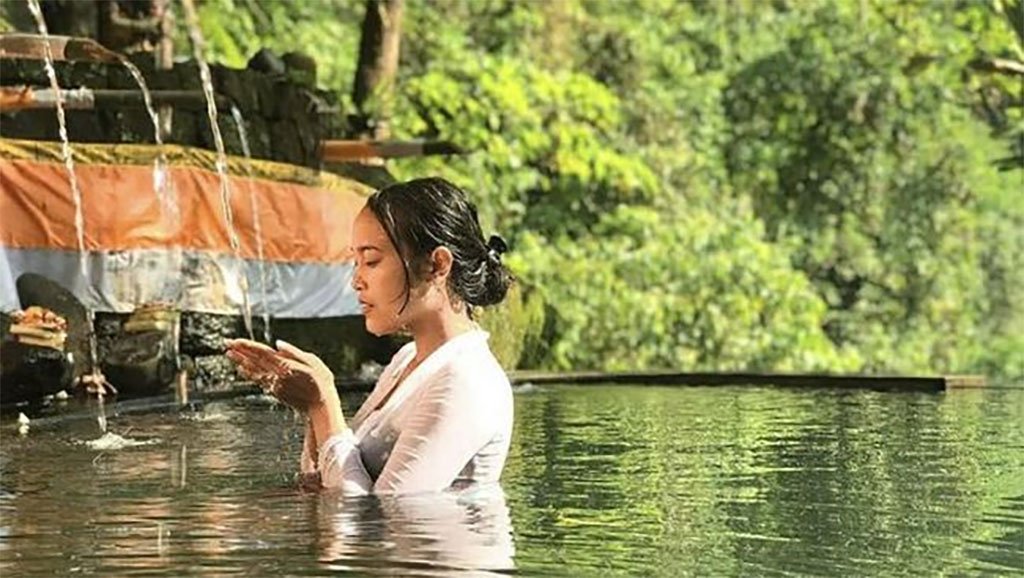Top 9 Bali Outdoor Wellness Escapes Combining Yoga and Nature’s Serenity
Bali, Indonesia — a mystical island known for its breathtaking landscapes, vibrant culture, and spiritual heritage — has emerged as a premier... Read More

Balinese culture is rich with vibrant traditions, deeply rooted in spirituality and harmony with nature. One of the most fascinating and sacred ceremonies in Bali is the Water Purification Ceremony, known locally as Melukat. This ritual is a profound expression of cleansing, both physically and spiritually, aimed at purifying the body, mind, and soul. It is deeply intertwined with the island’s Hindu beliefs and its close relationship with natural elements, especially water.
If you ever find yourself on the Island of the Gods, witnessing or participating in a Melukat ceremony can be a transformative and eye-opening experience. This article will take you on a detailed journey through what happens during a Balinese water purification ceremony, the symbolism behind it, and why it remains a vital practice in Balinese spiritual life. Let’s dive in! 🌴✨
In Balinese Hinduism, water is considered sacred and a powerful agent for cleansing negative energies. The Melukat ceremony is a ritual purification that typically involves the use of holy water drawn from sacred springs, rivers, or temple water sources. It is believed to wash away impurities, bad luck, and spiritual blockages, helping the individual achieve a state of balance and spiritual renewal.
The ceremony is more than just a cleansing ritual—it is a deeply symbolic act connecting the participant with the divine, nature, and their own inner self. It often marks new beginnings, healing, or preparation for other important life events.
Melukat has ancient roots tracing back to Hindu-Balinese cosmology. According to Balinese belief, the universe is divided into three realms: the upper realm (Swah), the middle realm (Bwah), and the lower realm (Bhwah). Water is the unifying force that connects these realms, symbolizing purity and balance.
The ceremony often involves prayers to Sang Hyang Widhi Wasa, the supreme god in Balinese Hinduism, as well as various deities associated with water, like Dewi Danu, the goddess of lakes and rivers. The ritual honors these divine forces and invites their blessings for cleansing and protection.
Preparation is key for a successful Melukat. Participants often fast or avoid certain foods and behaviors prior to the ritual to enhance spiritual readiness. Wearing traditional white clothing symbolizes purity and respect.
The setting is equally important. Most ceremonies take place at Tirta Empul, the famous holy spring temple near Ubud, or other sacred water sites like rivers or temple pools. These waters are believed to carry divine energy, having been blessed and purified by priests through chanting and offerings.
A key figure in the ceremony is the pemangku or pedanda — a Balinese priest trained in sacred rituals. They conduct the ceremony, leading prayers, chants, and the application of holy water.
The priest blesses the water with mantras (sacred chants), infusing it with spiritual power. This holy water becomes the medium through which the purification occurs. The priest also provides guidance on the steps of the ritual and ensures that participants maintain reverence throughout the process.
The ceremony begins with offerings made to the gods—colorful flowers, rice, incense, and symbolic items are arranged on small trays called canang sari. These offerings express gratitude and seek permission from the spiritual realm.
Participants join the priest in chanting mantras, creating a sacred atmosphere filled with spiritual energy.
The priest blesses the water, often using a leaf or special tool to sprinkle it over the participants. This act symbolizes the transmission of divine energy into the water.
Depending on the location and type of ceremony, participants either immerse themselves fully in the holy spring or have water poured or sprinkled over their heads and bodies. The flowing water is believed to wash away negative energies, sins, and spiritual obstacles.
At Tirta Empul, people often enter a series of cleansing pools, moving through fountains where water streams over them one by one.
After the physical cleansing, participants engage in silent meditation or prayer, reflecting on renewal, forgiveness, and personal intentions. This stage is vital for internalizing the purification and aligning the spirit.
The ceremony ends with final prayers and sometimes a small communal feast. Participants thank the gods, the priest, and each other, feeling renewed and spiritually uplifted.
Water in Balinese culture is much more than a natural resource—it’s a sacred bridge between the physical and spiritual worlds. Here are some key symbolic meanings:
Melukat is open to anyone seeking spiritual purification, but it is especially significant for:
While rooted in ancient tradition, the Melukat ceremony has adapted to modern times. Some Balinese temples offer Melukat for tourists interested in spiritual experiences, though these are often simplified versions to accommodate outsiders.
Local communities continue to maintain the authenticity of the ritual, preserving its sacredness and cultural value. This blend of tradition and modern interest has helped keep the ceremony alive, promoting Balinese spirituality worldwide.
If you want to observe or join a Melukat ceremony:
Many who participate in Melukat report profound personal changes—emotional release, renewed energy, and a sense of peace. The ritual serves as a powerful reminder of the connection between body, mind, and spirit, encouraging ongoing self-care and spiritual growth.
The Balinese Water Purification Ceremony, Melukat, is a beautiful example of how ancient rituals continue to nurture human connection to nature and the divine. Through water’s symbolic cleansing power, participants not only refresh their physical bodies but also rejuvenate their spirits, inviting harmony and positivity into their lives.
Whether you visit Bali for its beaches, temples, or vibrant culture, witnessing a Melukat ceremony is an unforgettable way to glimpse the island’s spiritual heart. It is a celebration of life’s purity and renewal — a timeless tradition flowing through Bali’s cultural fabric like the sacred waters themselves. 🌊🙏
Join The Discussion